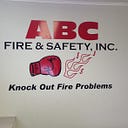Choosing the Right Fire Alarm System for Your New Jersey Property
Introduction:
Choosing the right fire alarm system for your New Jersey property is a crucial decision to ensure the safety of your building and its occupants. There are many factors to consider when selecting a fire alarm system, including the type of building, the size of the property, and the needs of its occupants. In this article, we will discuss how to choose the right fire alarm system in New Jersey property.

Factors to Consider When Choosing a Fire Alarm System:
Building Type: The type of building is a crucial factor to consider when selecting a fire alarm system. Different types of buildings, such as residential, commercial, or industrial, may require different types of fire alarm systems. It is important to select a system that is appropriate for your building type and meets local regulations.
Size of the Property: The size of the property is another important factor to consider when selecting a fire alarm system. Larger properties may require more complex systems with additional components, such as smoke detectors and sprinklers, to ensure proper coverage.
Occupancy Needs: The needs of the building’s occupants should also be considered when selecting a fire alarm system. For example, a system for a hospital may require additional features, such as voice alarms, to ensure that patients with hearing impairments are alerted in the event of a fire.
Maintenance and Upkeep: It is important to consider the maintenance and upkeep requirements of a fire alarm system when selecting one for your property. Some systems require more frequent maintenance than others, and it is important to ensure that you can meet those requirements to ensure the system functions correctly in the event of an emergency.
Types of Fire Alarm Systems:
Conventional Fire Alarm Systems: Conventional fire alarm systems are one of the most commonly used types of fire alarm systems. They are relatively simple and consist of detectors that are wired to a central control panel. Conventional systems can be a cost-effective option for smaller properties, but they may not provide the level of coverage required for larger or more complex buildings.
Addressable Fire Alarm Systems: Addressable fire alarm systems are more complex than conventional systems and are designed for larger properties. They consist of multiple detectors that are connected to a central control panel, and each detector is assigned a unique address. This allows the system to identify the exact location of a fire and provide more detailed information to emergency services.
Wireless Fire Alarm Systems: Wireless fire alarm systems use radio waves to communicate between detectors and a central control panel, eliminating the need for wiring. They are a good option for properties where wiring is not feasible, such as historic buildings. However, they may not provide the same level of reliability as wired systems and may require more frequent battery replacement.
Hybrid Fire Alarm Systems: Hybrid fire alarm systems combine the features of both conventional and addressable systems. They are a good option for properties that require the flexibility of a conventional system but also need the detailed information provided by an addressable system.
FAQs:
Q. Do I need a fire alarm system for my New Jersey property?
A. Fire alarm systems are required by law in certain types of buildings in New Jersey, including commercial, industrial, and multi-family residential properties. It is important to check local regulations to determine if your property requires a fire alarm system.
Q. Can I install a fire alarm system myself?
A. It is not recommended to install a fire alarm system yourself unless you have experience and training in the installation of fire alarm systems. It is best to consult with a qualified fire alarm system provider to ensure the system is installed correctly and meets local regulations.
Q. How often should I have my fire alarm system inspected?
A. The National Fire Protection Association recommends that fire alarm systems be inspected at least once a year by a licensed fire alarm system provider. Additionally, the system should be tested regularly, at least every six months, to ensure proper functioning.
Q. What are the benefits of a fire alarm system?
A. Fire alarm systems provide early warning in the event of a fire, which can help to minimize damage and prevent injury or loss of life. They also provide peace of mind for property owners and occupants, knowing that there is a system in place to detect and alert them in the event of a fire.
Q. Can a fire alarm system be integrated with other building systems?
A. Yes, fire alarm systems can be integrated with other building systems, such as sprinklers and security systems, to provide a comprehensive safety solution for your property.
Conclusion:
Choosing the right fire alarm system for your New Jersey property is an important decision that should not be taken lightly. It is important to consider the type of building, size of the property, and needs of its occupants when selecting a system. Additionally, maintenance and upkeep requirements should be considered to ensure the system functions properly in the event of an emergency. Consult with a qualified fire alarm system provider to determine the best system for your property and ensure compliance with local regulations. By selecting the right system and properly maintaining it, you can ensure the safety of your property and its occupants in the event of a fire.
